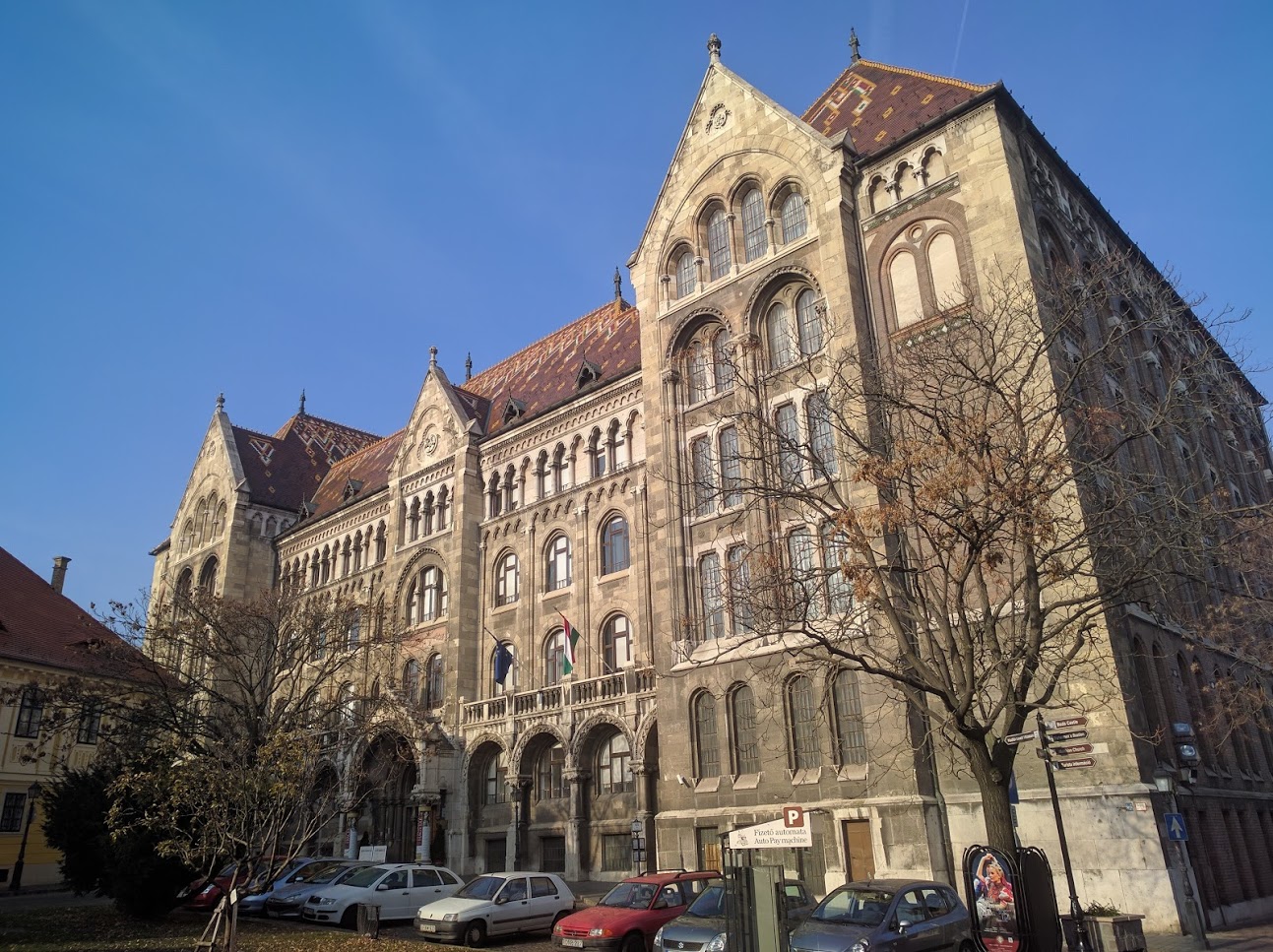
Over the last three years, the partners of the E-ARK Project have worked together to develop and test specifications and tools for the creation and management of information packages for preservation. Around this work they have also been busily undertaking complementary research and resource creation, resulting in a wide variety of new and improved practical solutions for those undertaking digital preservation activities.
On a crisp, cold day at the beginning of December 2016, we gathered at the beautiful main building of the National Archives of Hungary in Budapest (see right) to share the results of all that hard work at our final conference. I was there on behalf of the DPC and, even as a member of the project team, I was impressed by the scope and quality of the work shared during the event.
In this blog post, through the medium of the Tweets we sent out into the wild over the two days, I hope to share some of the highlights from presentations given at the conference. The tools, resources and solutions they mention will be of interest to many DPC members and friends. More information on all the E-ARK resources mentioned below can be found on the project website: http://www.eark-project.eu.
After a welcome to the event from Szuzanna Miko, Director of the conference hosts the National Archives of Hungary, Clive Billenness kicked off day one with an introduction to the project and it’s practical approach:
#EARKProject designed to allow users of our tools to access parts or a complete integrated solution #EARK16
— E-ARK Project (@EARKProject) December 6, 2016
Billenness: E-ARK Project pilots based in organisations that had identified a real business need for these solutions #EARK16
— E-ARK Project (@EARKProject) December 6, 2016
This was followed by an inspiring keynote from Alina Senn of the European Commission:
Senn: key events are no longer just documented by privileged few. Everyone captures their own experience, true world of big data #EARK16
— E-ARK Project (@EARKProject) December 6, 2016
Senn: there are no boundaries for science and research, good work can inspire people the world over #EARK16
— E-ARK Project (@EARKProject) December 6, 2016
Janet Delve of the University of Brighton was quick to let slip the true aims of E-ARK:
Delve: #EARKProject aiming for world domination! (For the E-ARK tools and formats...) #EARK16
— E-ARK Project (@EARKProject) December 6, 2016
But, then again, the impact of the project is already obvious:
Delve: pilot in Slovenia in Environmental Ministry has allowed them to establish archival process where there were none #EARK16
— E-ARK Project (@EARKProject) December 6, 2016
Delve: already take up from NARA, National Archives of Chile and EC Publications Office #EARK16
— E-ARK Project (@EARKProject) December 6, 2016
We were then given overviews of the 7 pilots undertaken by the project, which examined 20 different practical, real-world scenarios:
2 pilots looking at archiving databases with the SIARD format, 1 pilot looking at creating SIPs from EDRMS systems #EARK16
— E-ARK Project (@EARKProject) December 6, 2016
1 pilot looking at generating AIPs from SIPs, 1 pilot testing the tools with geodata, 1 pilot looking at access & creating DIPs #EARK16
— E-ARK Project (@EARKProject) December 6, 2016
Day one continued after lunch with a keynote from Angela Dappert of the British Library, sharing some interesting thoughts on standard development:
Dappert: 'standard' is a neutral term but one that is emotionally charged #EARK16
— E-ARK Project (@EARKProject) December 6, 2016
Dappert: EARK has worked hard to develop interoperability and standardisation, users can benefit from efficiencies #EARK16
— E-ARK Project (@EARKProject) December 6, 2016
Ricardo Vieira, of the Technical University of Lisbon, introduced useful resources available via the E-ARK Knowledge Centre:
Vieira: #EARK Knowledge Centre includes a MoReq schema validator & soon a MoReq assessment #EARK16
— E-ARK Project (@EARKProject) December 6, 2016
Vieira: Knowledge Centre tool walks you through maturity model assessment, providing detailed results and highlights areas for work #EARK16
— E-ARK Project (@EARKProject) December 6, 2016
On day two David Anderson, University of Brighton, gave a whirlwind tour of the legal research undertaken as part of E-ARK:
Anderson: EC reforming data protection: higher fines, broader enforcement & definitions, creating new responsibilities & liabilities #EARK16
— E-ARK Project (@EARKProject) December 7, 2016
Anderson: archives will need to take a conservative approach to personal data #EARK16
— E-ARK Project (@EARKProject) December 7, 2016
Anderson: must incorporate privacy by design, ad hoc approach will no longer suffice #EARK16
— E-ARK Project (@EARKProject) December 7, 2016
Picking up from day one’s pilot overviews, István Alföldi of the National Archives of Hungary discussed the E-ARK General Model, another of the resources available in the Knowledge Centre:
E-ARK General Model allows users to navigate info on E-ARK pilots & access detailed specifications and results #EARK16
— E-ARK Project (@EARKProject) December 7, 2016
A key component of E-ARK is the Common Specification for Information Packages, which Kuldar Aas, of the National Archives of Estonia, discussed:
Aas: IP design led by implementation needs, interoperability, balance of standardisation & simplicity, & being robust & scalable #EARK16
— E-ARK Project (@EARKProject) December 7, 2016
Aas: #EARK spec for IPs aim to support automation of high-level package identification and validation #EARK16
— E-ARK Project (@EARKProject) December 7, 2016
Aas: Can use IP specs for any type of data, extension through content info type spec. Also extension point for local customisation #EARK16
— E-ARK Project (@EARKProject) December 7, 2016
Aas: Common spec metadata implementation based on METS, made about 20 additions to original standard #EARK16
— E-ARK Project (@EARKProject) December 7, 2016
One of the great strengths of the project, which was well demonstrated at the conference, was the variety of solutions developed:
Sven Schlarb points out that E-ARK not only offers practical tools for digital archiving workflow but it offers a CHOICE of tools #EARK16
— E-ARK Project (@EARKProject) December 7, 2016
This was a theme of the rest of the day as well as in the final key note from Krystyna Ohnesorge of the Swiss Federal Archives:
Lanre Abiwon giving us an introduction to the ERMS export process developed by Magenta ApS #EARK16
— E-ARK Project (@EARKProject) December 7, 2016
Bjorn Skog of ES Solutions now providing an Introduction to the ESSArch system #EARK16
— E-ARK Project (@EARKProject) December 7, 2016
Back from lunch we're hearing about RODA & RODA-in from Miguel Ferreira of KEEP Solutions #EARK16
— E-ARK Project (@EARKProject) December 7, 2016
Ohnesorge: normalisation using SIARD has given greater confidence in reuse of database in future #EARK16
— E-ARK Project (@EARKProject) December 7, 2016
Miguel Ferreira back to talk about the SIARD 2.0 format and tools developed in the E-ARK project to support it #EARK16
— E-ARK Project (@EARKProject) December 7, 2016
Find out more about all the tools and solutions developed during E-ARK on the project website.
And finally, if you’re wondering about sustainability of the E-ARK products:
Delve: after project - DLM forum standards board, OPF undertaking 'acceptance testing', plus ongoing sustainability #EARK16
— E-ARK Project (@EARKProject) December 6, 2016
Slides from the presentations at the conference are available on the E-ARK Website and videos will be available in due course.













































































































































